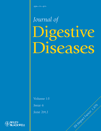
Journal of Digestive Diseases
Scope & Guideline
Advancing Gastroenterology Through Innovative Research
Introduction
Aims and Scopes
- Gastrointestinal Disease Mechanisms:
Research on the underlying mechanisms of gastrointestinal diseases, including autoimmune conditions, inflammation, and genetic factors. - Diagnostic Innovations:
Development and validation of new diagnostic techniques, including endoscopic procedures, imaging techniques, and artificial intelligence applications. - Therapeutic Approaches:
Exploration of novel therapeutic strategies, including pharmacological treatments, nutritional interventions, and endoscopic therapies. - Risk Assessment and Predictive Models:
Creation of scoring systems and predictive models for disease outcomes, complications, and treatment responses. - Microbiome Research:
Investigation of the gut microbiome's role in health and disease, including its interactions with diet and disease states. - Multidisciplinary Approaches:
Emphasis on the importance of interdisciplinary collaboration in the management of gastrointestinal diseases, including input from gastroenterologists, surgeons, dietitians, and psychologists.
Trending and Emerging
- Artificial Intelligence in Gastroenterology:
A growing trend is the application of artificial intelligence for improving diagnostic accuracy and treatment personalization in gastrointestinal diseases. - Microbiome and Gut Health:
Increased focus on the gut microbiome's impact on health, disease mechanisms, and therapeutic outcomes, emphasizing its role in conditions like IBS and IBD. - Innovative Endoscopic Techniques:
Emerging techniques in endoscopy, such as advanced imaging and minimally invasive interventions, are becoming prominent in research and clinical application. - Personalized Medicine Approaches:
There is a rising emphasis on personalized treatment plans based on genetic, microbiomic, and clinical profiles to enhance patient outcomes. - Integrated Care Models:
Research is increasingly focusing on integrated care models that combine medical, dietary, and psychological interventions for comprehensive management of digestive disorders.
Declining or Waning
- Traditional Surgical Techniques:
There appears to be a decreasing emphasis on conventional surgical interventions as minimally invasive techniques and endoscopic approaches gain popularity and efficacy. - Generalized Dietary Interventions:
Research specifically focused on generalized dietary modifications without a tailored approach is declining, as more personalized nutrition strategies are being explored. - Basic Pathophysiology Studies:
While foundational studies are essential, there is a noticeable waning in papers that do not connect basic research with clinical applications or outcomes. - Overly Broad Epidemiological Surveys:
Epidemiological studies lacking specific focus or actionable insights into digestive diseases are becoming less common, as the journal favors studies with clear implications for practice.
Similar Journals

DIGESTION
Advancing gastroenterology through rigorous research.DIGESTION is a prestigious journal dedicated to advancing the field of gastroenterology, published by KARGER, a renowned publisher based in Switzerland. With a rich history dating back to 1896, this journal has continuously evolved and serves as a vital platform for researchers, professionals, and students alike. DIGESTION is recognized for its scholarly contributions, holding an impressive rank of 23 out of 167 in the Scopus database, placing it within the top 14% of gastroenterology journals, as evidenced by its Q2 classification. The journal's commitment to high-quality research is reflected in its wide-ranging scope, addressing various aspects of digestive health, clinical practices, and innovative therapies. Though not an open-access journal, it provides comprehensive access options that ensure the dissemination of crucial research findings to the global community. As we move towards 2024, DIGESTION continues to facilitate dialogue and insights in gastroenterological research, making it an indispensable resource for those in the field.

Gut and Liver
Connecting science and practice in digestive health.Gut and Liver is a prestigious peer-reviewed journal dedicated to advancing the fields of Gastroenterology and Hepatology. Published by the EDITORIAL OFFICE GUT & LIVER in South Korea, this Open Access journal has been disseminating valuable research findings since 2007, making critical knowledge accessible to a global audience. With an impressive 2023 impact factor that places it in Q1 rank in both Gastroenterology (#28/167) and Hepatology (#22/82), it is recognized as a leader in the medical domain. The journal covers diverse topics, including innovative therapeutic strategies, clinical practices, and groundbreaking research in liver diseases and gastrointestinal disorders, thereby playing a vital role in improving patient care and outcomes. Researchers, healthcare professionals, and students can benefit from the journal's wealth of information, designed to foster collaboration and spark new ideas within the scientific community. For further engagement with current research, readers can access issues from 2009 to 2024 and stay updated on the latest advancements in the field.
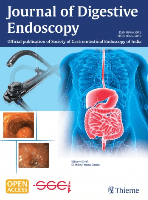
Journal of Digestive Endoscopy
Exploring the Depths of Digestive EndoscopyJournal of Digestive Endoscopy is a premier academic journal published by THIEME MEDICAL PUBL INC, focusing on the rapid advancements and innovative techniques in the field of digestive endoscopy. Established as an Open Access platform since 2011, this journal aims to disseminate high-quality research, reviews, and clinical studies that contribute to the understanding and improvement of digestive health. Featuring a broad spectrum of topics ranging from diagnostic procedures to therapeutic interventions, the journal serves as an essential resource for researchers, clinicians, and students alike who seek to enhance patient outcomes and advance their knowledge in gastroenterology. With its commitment to accessibility and academic rigor, the Journal of Digestive Endoscopy plays a vital role in fostering collaboration and innovation within the scientific community.
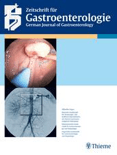
ZEITSCHRIFT FUR GASTROENTEROLOGIE
Exploring the Frontiers of Gastroenterology ResearchZEITSCHRIFT FUR GASTROENTEROLOGIE, published by GEORG THIEME VERLAG KG, stands as a notable journal in the field of gastroenterology since its inception in 1971. With an ISSN of 0044-2771 and an E-ISSN of 1439-7803, this journal focuses on advancing knowledge and research in gastrointestinal health. Operating from Germany, its contributions span various aspects of gastroenterology, providing a platform for both established and emerging scholars to share their findings. As of 2023, ZEITSCHRIFT FUR GASTROENTEROLOGIE is ranked in the Q3 quartile in Gastroenterology and Q4 in Medicine (miscellaneous), reflecting its critical yet developing role in the academic community. Despite its current Scopus rank of #117 out of 167 in the gastroenterology category, the journal aims to foster innovative research and discussions vital for tackling contemporary challenges in gastrointestinal medicine. While it does not offer open access, the journal's extensive archival rigor ensures that pertinent studies remain accessible to professionals and academicians seeking to deepen their understanding and engage with evolving clinical practices.
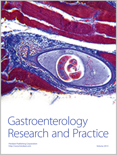
Gastroenterology Research and Practice
Empowering Healthcare with Open Access KnowledgeGastroenterology Research and Practice is a leading Open Access journal dedicated to advancing the field of gastroenterology and hepatology. Published by HINDAWI LTD, this journal offers a platform for researchers, clinicians, and healthcare professionals to share their findings and insights on cutting-edge topics in digestive health. With an ISSN of 1687-6121 and an E-ISSN of 1687-630X, it has established its significance within the academic community, evidenced by its ranking in the 2023 Scopus metrics, where it is positioned in the third quartile for both gastroenterology and hepatology disciplines. The journal is recognized for disseminating high-quality, peer-reviewed articles that contribute to the understanding of gastrointestinal disorders, therapeutic advancements, and innovative practices. Since its inception as an Open Access journal in 2008, Gastroenterology Research and Practice has removed barriers to access, ensuring that vital research reaches a global audience. This ongoing commitment to increasing accessibility, alongside its continuous publication from 2009 to 2024, underscores its importance as a resource for the academic and clinical communities striving to improve patient outcomes in digestive diseases.

JOURNAL OF GASTROENTEROLOGY
Pioneering breakthroughs in digestive health.JOURNAL OF GASTROENTEROLOGY, published by SPRINGER JAPAN KK, is a premier academic journal that has been at the forefront of gastrointestinal research since its inception in 1994. With an impressive Impact Factor and ranking in the top quartile (Q1) of its category, this journal holds a significant place in the field of gastroenterology, currently ranked 12th out of 167 in Scopus, placing it in the 93rd percentile. The journal serves as an essential platform for disseminating innovative research, clinical studies, and reviews that foster advancements in the understanding and treatment of gastrointestinal diseases. Although it does not offer Open Access options, it provides researchers, clinicians, and students access to crucial insights and breakthroughs pivotal to improving patient care and outcomes in gastroenterology. With a commitment to high-quality peer-reviewed content, JOURNAL OF GASTROENTEROLOGY plays a vital role in shaping the future of gastrointestinal health and research.

Gastroenterology Insights
Innovating Research for a Healthier GutGastroenterology Insights is a premier open-access journal published by MDPI since 2009, focusing on essential research and developments within the fields of gastroenterology and hepatology. With a dedicated ISSN of 2036-7414 and E-ISSN 2036-7422, this journal serves as a vital platform for disseminating innovative studies and insights pertinent to gastrointestinal health, disorders, and treatment modalities. Based in Switzerland, Gastroenterology Insights boasts a significant academic presence, currently positioned in the Q3 quartile for both gastroenterology and hepatology categories as of 2023, reflecting its impactful contributions to the disciplines. With Scopus rankings placing it at the 94th and 48th positions in gastroenterology and hepatology respectively, the journal is committed to advancing knowledge and fostering collaboration among researchers, professionals, and students alike. By providing an open-access model, it ensures that high-quality research is accessible globally, thereby enhancing the reach and impact of crucial findings in the science of digestive health. Researchers looking to publish cutting-edge work will find Gastroenterology Insights a valuable resource for both sharing and acquiring knowledge.
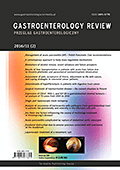
Gastroenterology Review-Przeglad Gastroenterologiczny
Unlocking Innovations in Gastroenterology ResearchGastroenterology Review-Przeglad Gastroenterologiczny is a premier, peer-reviewed journal published by TERMEDIA PUBLISHING HOUSE LTD, focusing on the dynamic field of gastroenterology. Since its inception in 2006, it has embraced an Open Access model, ensuring that the latest research is readily accessible to a global audience, fostering collaboration and innovation. Based in Poland, this journal serves as a crucial platform for disseminating significant findings in gastrointestinal research, with a current Scopus rank placing it at the 39th percentile in its category. With a commitment to advancing the understanding of gastroenterological conditions, *Gastroenterology Review* publishes original articles, reviews, and case studies that contribute to both clinical practice and academic research. The journal is particularly aimed at researchers, healthcare professionals, and students who ignite dialogues that shape the future of gastrointestinal health. Explore the comprehensive insights that this journal offers, as it encapsulates vital developments from 2008 to 2024 in the ever-evolving landscape of gastroenterology.
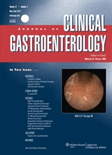
JOURNAL OF CLINICAL GASTROENTEROLOGY
Exploring innovative therapies for better patient outcomes.JOURNAL OF CLINICAL GASTROENTEROLOGY, published by Lippincott Williams & Wilkins, stands as a pivotal resource in the field of gastroenterology, providing critical insights and research findings since its inception in 1979. With an ISSN of 0192-0790 and an E-ISSN of 1539-2031, this esteemed journal continues to contribute to advancements in understanding gastrointestinal diseases and their management. The journal's impressive ranking as Q2 in 2023 among gastroenterology publications, alongside its Scopus ranking of #45/167 (73rd percentile), underscores its influence and relevance in the medical community. While it operates on a subscription model with no current open access options, the JOURNAL OF CLINICAL GASTROENTEROLOGY remains an essential platform for researchers, professionals, and students aiming to deepen their understanding of clinical practices and innovative therapies in gastroenterology. Located in Philadelphia, PA, this journal is committed to shaping the future of gastrointestinal health and enhancing clinical practices worldwide.

Gastroenterology
Advancing Digestive Health Through Premier ResearchGastroenterology, published by W B Saunders Co-Elsevier Inc, is a premier journal dedicated to advancing the knowledge and practice within the fields of gastroenterology and hepatology. Established in 1945 and covering a wide range of topics related to digestive health, this journal holds a distinguished position in the academic community, as evidenced by its impressive Q1 status in both Gastroenterology and Hepatology categories, and its high rankings (4th in both disciplines) in Scopus, placing it in the top percentile for scholarly impact. With its commitment to publishing high-quality research, reviews, and clinical studies, Gastroenterology provides an essential resource for researchers, healthcare professionals, and students seeking cutting-edge insights that inform clinical practices and enhance patient care. Although it does not currently offer open access, the journal continues to serve as a vital platform for disseminating meaningful research that shapes the future of digestive disease management.